Conventional generators are a crucial part of many industries, providing power when and where it’s needed. They work by using the principles of electromagnetic induction to generate electrical energy. A conventional generator consists of a stationary part, known as the stator, and a rotating part, known as the rotor. When the rotor rotates, it creates a magnetic field that induces an electric current in the stator’s coils of wire. This current is then carried to an external circuit, which uses the electrical energy to power equipment or devices.
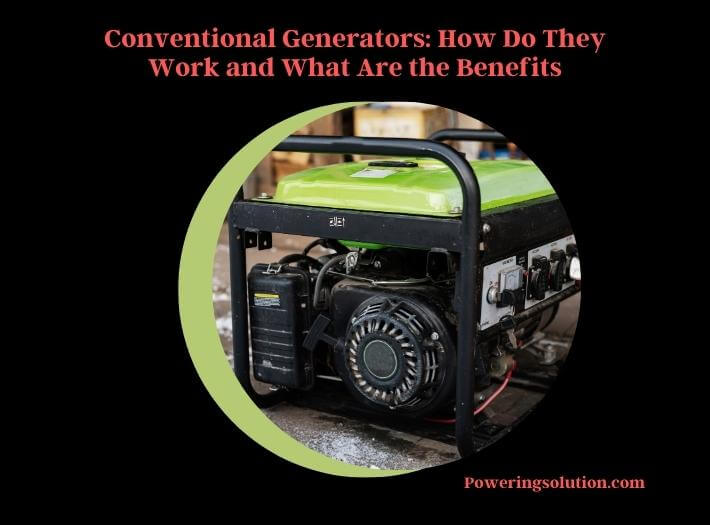
Conventional generators have been used for decades and continue to be a reliable and cost-effective source of power. They are often used as backup power sources in case of power outages, providing a continuous source of power for critical equipment and devices. They are also widely used in various industries, including healthcare, construction, agriculture, and manufacturing, among others.
Despite the growing popularity of renewable energy sources, such as solar and wind power, conventional generators remain an important part of the energy landscape. They are readily available and can be used in remote locations where other sources of power are not available. Additionally, they are relatively easy to maintain, and their parts are readily available, making them a popular choice for many industries.
Types of Fuel Used in Conventional Generators
Conventional generators are powered by different types of fuel, depending on the model and application. The most common types of fuel used in conventional generators include:
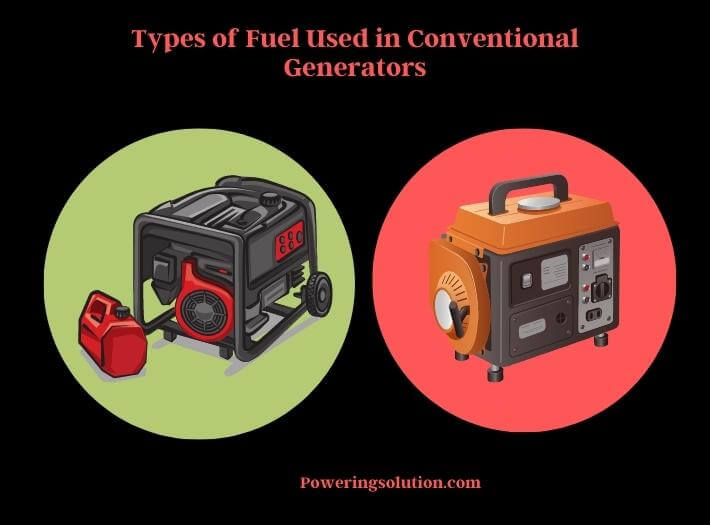
Gasoline
Gasoline-powered generators are commonly used for smaller applications, such as camping or powering small appliances during a power outage. Gasoline is readily available and easy to store, making it a convenient option for many users.
Diesel
Diesel-powered generators are often used for larger applications, such as powering industrial equipment or providing backup power to hospitals or data centers. Diesel is more efficient than gasoline, meaning that diesel generators can generate more power using less fuel.
Natural gas
Natural gas-powered generators are becoming increasingly popular due to their lower emissions and cost-effectiveness. Natural gas is a cleaner-burning fuel than gasoline or diesel, meaning that natural gas generators produce fewer emissions.
Propane
Propane-powered generators are another option for users looking for cleaner-burning fuel. Propane is readily available and can be stored for long periods of time, making it a convenient option for backup power.
Factors to Consider When Choosing a Conventional Generator
Choosing the right conventional generator can be a daunting task, especially if you’re not familiar with the different types of generators and their features.
The power output of the generator is one of the most important factors to consider. It determines the amount of electrical energy the generator can produce and how many devices it can power at once. Make sure to choose a generator that can handle the power demands of your equipment or appliances.
The type of fuel used by the generator is another important consideration. As discussed earlier, different types of fuel have different advantages and disadvantages, so choose the fuel type that best suits your needs.
Conventional generators can be quite loud, so consider the noise level when choosing a generator. Look for generators that have noise-reducing features, such as soundproofing or mufflers.
The run time of the generator refers to how long it can run on a full tank of fuel. Consider the run time when choosing a generator, especially if you need to use it for extended periods of time.
Consider the size and portability of the generator, especially if you plan to move it around frequently. Look for generators that are compact and lightweight, and have features such as wheels or handles for easy transport.
Finally, consider the price of the generator. Conventional generators can range from a few hundred dollars to several thousand dollars, so choose a generator that fits your budget.
Maintaining and Operating Conventional Generators
Maintaining and operating your conventional generator is important to ensure it runs efficiently and lasts a long time.
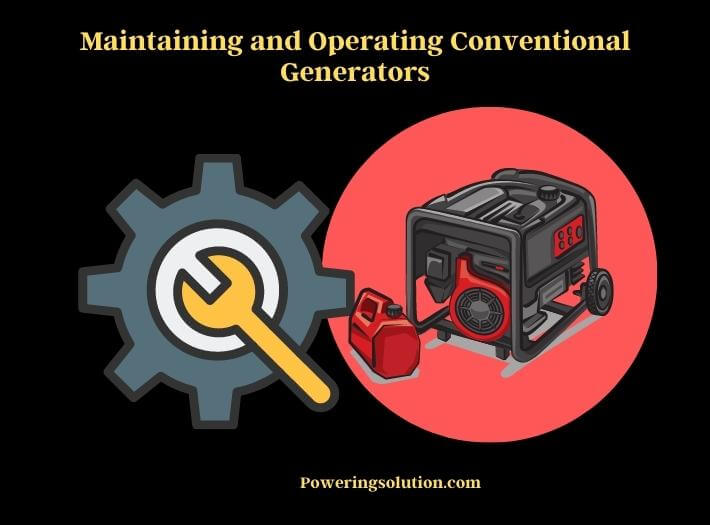
Regular maintenance is crucial to keep your generator in good working condition. Check the oil level and air filter regularly, and replace them as needed. Also, inspect the spark plug and replace it if it’s worn or damaged. Follow the manufacturer’s instructions for maintenance and service intervals.
Proper fuel management is important to prevent fuel-related problems. Store fuel in a clean, dry, and well-ventilated area, and use fresh fuel to prevent stale fuel issues. Also, add a fuel stabilizer to the fuel to prolong its shelf life.
Follow the manufacturer’s instructions for starting the generator. Make sure the generator is on a flat surface and in a well-ventilated area before starting it. Let the generator warm up before connecting any devices or appliances.
Avoid overloading the generator by not connecting more devices or appliances than it’s designed to handle. This can cause damage to the generator and potentially harm the connected devices or appliances.
Follow the manufacturer’s instructions for shutting down the generator. Let the generator run for a few minutes without any load before turning it off. This will allow it to cool down and prevent any damage to the engine or other components.
Applications of Conventional Generators
Conventional generators have a wide range of applications in different industries and settings. Conventional generators are commonly used as backup power sources for homes, businesses, and industries. They provide reliable and continuous power in case of power outages or emergencies.
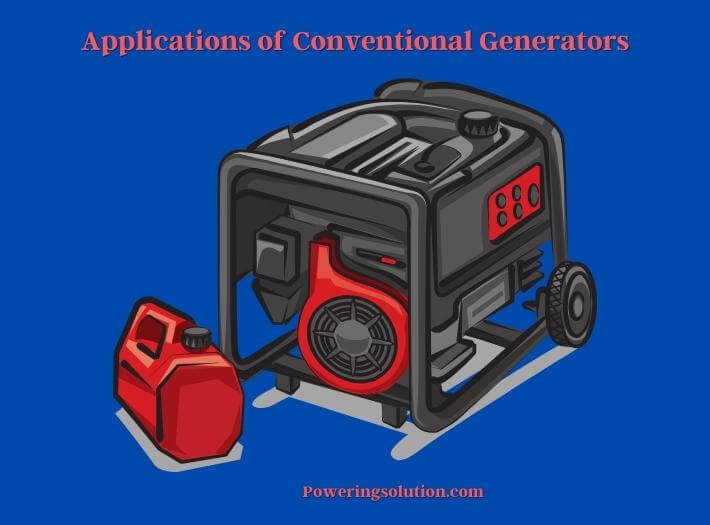
Conventional generators are commonly used in construction sites to power tools and equipment. They provide a convenient and reliable power source in remote or temporary locations.
Conventional generators are commonly used for outdoor events and activities such as concerts, festivals, and camping. They provide a convenient and reliable power source in areas without access to grid power.
Conventional generators are commonly used in healthcare facilities such as hospitals and clinics as backup power sources. They ensure uninterrupted power supply to critical medical equipment and devices.
Conventional generators are commonly used in telecommunications facilities such as cell towers and data centers. They provide backup power to ensure uninterrupted communication services.
Conventional generators are commonly used in agriculture for powering irrigation systems and other farm equipment. They provide reliable and convenient power in remote or off-grid locations.
Conventional generators have numerous applications across different industries and settings. They provide a reliable and convenient power source in areas without access to grid power or in case of power outages.
Environmental Impact of Conventional Generators
Conventional generators can have a significant environmental impact due to their emissions and fuel consumption. Here are some of the environmental impacts associated with conventional generators:
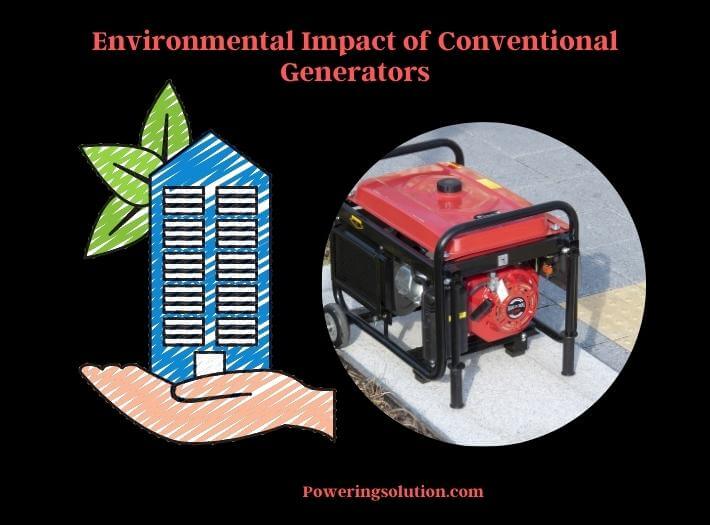
Air pollution: Conventional generators emit pollutants such as carbon monoxide, nitrogen oxides, and particulate matter. These pollutants can have harmful effects on human health and the environment, contributing to respiratory problems, acid rain, and climate change.
Noise pollution: Conventional generators can generate significant noise pollution, which can be a nuisance to people and wildlife in the surrounding areas. This can have negative impacts on human health, wildlife behavior, and the overall environment.
Fuel consumption: Conventional generators typically run on fossil fuels such as gasoline, diesel, or propane. These fuels are non-renewable resources that contribute to greenhouse gas emissions and climate change. Additionally, the extraction, transportation, and storage of these fuels can have negative environmental impacts, such as oil spills and habitat destruction.
Waste generation: Conventional generators require regular maintenance and may generate waste such as used oil, filters, and batteries. Improper disposal of these wastes can have negative environmental impacts such as soil and water contamination.
To mitigate the environmental impacts of conventional generators, there are some steps that can be taken. For example:
Use cleaner fuels: Switching to cleaner fuels such as biodiesel, ethanol, or propane can reduce emissions and dependence on fossil fuels.
Proper maintenance: Regular maintenance of the generator can ensure it runs efficiently and emits fewer pollutants.
Noise reduction measures: Installing noise barriers or mufflers can reduce the noise pollution generated by the generator.
Proper waste disposal: Properly disposing of the waste generated by the generator can prevent environmental contamination.
Conventional generators can have significant environmental impacts, but there are steps that can be taken to mitigate these impacts and make their use more sustainable.
Innovations in Conventional Generators
Conventional generators have been around for many years, and while they remain a reliable source of power, there have been many innovations and advancements that have improved their efficiency and reduced their environmental impact.
Inverter generators are a type of conventional generator that use advanced electronics to regulate the power output. This technology results in more efficient and cleaner power output, with lower emissions and better fuel economy.
Conventional generators can now come equipped with smart controls that allow for remote monitoring and control of the generator. This allows for more efficient operation and reduces the need for manual intervention.
Hybrid generators are a combination of conventional generators and renewable energy sources such as solar or wind. These generators can use renewable energy sources when available and switch to conventional power when necessary, resulting in reduced fuel consumption and emissions.
Some conventional generators now use variable speed technology, which allows the engine to operate at different speeds depending on the power demand. This results in improved fuel efficiency and reduced emissions.
Some conventional generators now have dual-fuel capabilities, allowing them to run on both gasoline and propane. Propane is a cleaner burning fuel than gasoline, resulting in lower emissions and better fuel economy.
These innovations in conventional generators have resulted in improved efficiency, reduced emissions, and better overall performance. As technology continues to advance, we can expect to see even more improvements in the future.
Common Misconceptions About Conventional Generators
Despite being a popular and widely used source of power, there are several common misconceptions about conventional generators.
- Generators are maintenance-free: One of the biggest misconceptions is that generators require no maintenance. In reality, generators require regular maintenance to ensure they are functioning properly and to prevent breakdowns.
- Generators can run indefinitely: Another common misconception is that generators can run indefinitely. In reality, generators require fuel, which must be replenished, and regular maintenance, which can involve shutting down the generator for a period of time.
- Generators are easy to operate: While starting a generator may seem simple, operating a generator requires some knowledge and understanding of electrical systems and safety procedures.
- All generators are the same: There are many different types and sizes of generators, each with its own specific uses and requirements. It’s important to choose the right generator for your specific needs to ensure it operates properly and safely.
- Generators can power an entire home: While some generators may be powerful enough to provide electricity to an entire home, it’s important to properly size the generator and understand its limitations to avoid overloading the system.
It’s important to understand these misconceptions to ensure the safe and effective use of conventional generators.
Future of Conventional Generators
As technology continues to advance, we can expect to see continued innovations and improvements in conventional generators. While conventional generators will continue to play an important role in powering homes and businesses, we can expect to see an increased use of renewable energy sources such as solar and wind power. This will help reduce the environmental impact of conventional generators and provide more sustainable sources of power.
As technology advances, we can expect to see continued improvements in the efficiency of conventional generators. This will result in better fuel economy, lower emissions, and reduced operating costs.
With the increasing use of smart technology, we can expect to see more advanced controls and monitoring systems for conventional generators. These systems will allow for remote monitoring and control of the generator, improving efficiency and reducing the need for manual intervention.
As the electrical grid becomes more advanced, we can expect to see conventional generators integrated with smart grid technology. This will allow for more efficient use of power and better integration with renewable energy sources.
We can expect to see more hybrid systems that combine conventional generators with renewable energy sources. These systems can provide reliable power while reducing the environmental impact of traditional generators.
The future of conventional generators is bright, with continued innovations and advancements that will improve efficiency, reduce environmental impact, and provide reliable sources of power.
Comparison to Alternative Energy Sources
While conventional generators are a reliable and widely used source of power, they are not without their drawbacks. Here are some of the key differences between conventional generators and alternative energy sources:
- One of the biggest differences between conventional generators and alternative energy sources is their impact on the environment. Conventional generators rely on fossil fuels such as gasoline, diesel, or natural gas, which contribute to air pollution and climate change. Alternative energy sources such as solar and wind power are renewable and produce little to no emissions.
- The cost of conventional generators can vary depending on the size and type of generator, as well as fuel costs. Alternative energy sources such as solar and wind power have become increasingly affordable in recent years and can provide long-term cost savings.
- Conventional generators are known for their reliability and can provide power during an outage or emergency situation. Alternative energy sources such as solar and wind power can be less reliable, as they are dependent on weather conditions.
- Conventional generators require regular maintenance to ensure they are functioning properly, while alternative energy sources such as solar and wind power require very little maintenance.
- Conventional generators can be used in a wide range of applications, from powering homes and businesses to providing backup power for hospitals and other critical infrastructure. Alternative energy sources such as solar (here is the battery calculator for solar) and wind power are better suited for specific applications and may not be suitable for all situations.
Ultimately, the choice between conventional generators and alternative energy sources will depend on your specific needs and priorities. While conventional generators are a reliable and widely used source of power, alternative energy sources offer a more sustainable and environmentally friendly option.
Economics of Conventional Generators
The economics of conventional generators can vary depending on several factors, including the type of fuel used, the size and capacity of the generator, and the cost of electricity in your area.
The cost of fuel is one of the biggest expenses associated with conventional generators. The price of gasoline, diesel, or natural gas can fluctuate, which can impact the cost of operating the generator. Additionally, the cost of fuel can vary depending on your location.
Conventional generators require regular maintenance to ensure they are functioning properly. This can include oil changes, filter replacements, and other routine maintenance tasks. The cost of maintenance can vary depending on the size and type of generator.
In addition to fuel and maintenance costs, there are other operating costs associated with conventional generators. These can include the cost of electricity used to power the generator, as well as any additional costs associated with installation, wiring, and other equipment.
Conventional generators can hold their value well over time, which can be a consideration if you plan to sell the generator in the future. The resale value of the generator can be impacted by factors such as its age, condition, and usage.
When considering a conventional generator, it’s important to consider the potential return on investment. This can include the value of the generator during power outages or emergencies, as well as any cost savings compared to alternative sources of power.
Last Remarks
Conventional generators have been a reliable source of backup power for many years. While they have some drawbacks, including environmental impact and maintenance costs, they offer several benefits, such as reliable power during emergencies, versatility in fuel options, and a relatively low cost compared to some alternative energy sources. As technology continues to advance, we may see innovations that improve the efficiency and environmental impact of conventional generators.
If you are considering a conventional generator for your home or business, it’s important to carefully evaluate your needs and consider factors such as fuel type, capacity, and operating costs. With proper maintenance and operation, a conventional generator can provide a reliable and cost-effective source of power for many years to come.
Conventional generators are an important part of the energy landscape and will likely continue to play a role in backup power generation for years to come. As we move towards a more sustainable and renewable energy future, it will be interesting to see how conventional generators evolve and adapt to changing energy needs and technologies.
